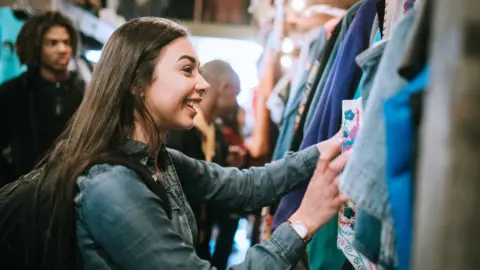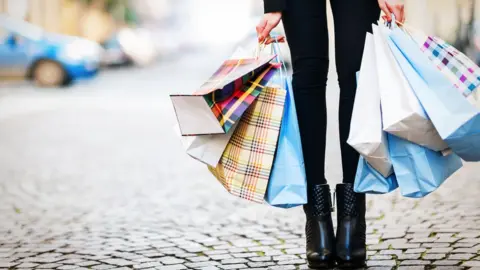Fast fashion: Should we change how we think about clothes?
 Getty Images
Getty ImagesA lot of us love a bargain outfit - we buy fast, we buy cheap and we too often wear things once and then throw them out.
But "fast fashion" is a major contributor to greenhouse gases, water and air pollution, creates problematic levels of waste, and often comes with poor working conditions in other countries.
The Environmental Audit Committee demanded the government clean up the industry, making 18 recommendations covering environmental and labour practices. The government says it is dealing with the problem.
Here's what sustainable fashion experts say we can we do to reduce the harmful effects of our shopping habits.
1. Buying less is more
"The most important thing essentially is buying less," says Tolmeia Gregory, an environmental activist who blogs about ethical fashion under the name Tolly Dolly Posh.
She says we need to get rid of the whole culture of buying clothing for specific occasions, such as nights out and holidays
 Tolmeia Gregory
Tolmeia Gregory "At first people can get defensive. You can feel attacked," she says. "But we have to try our best to break through that and think of it as more of a hopeful thing."
Kate Fletcher, Professor of Sustainability, Design, Fashion at the Centre for Sustainable Fashion, agrees. She says buying less clothing "is not at all some sort of devastating body blow".
She recommends going through your wardrobe and "noticing what you've already got that adds to the quality of your life".
"Many of us shop for things and realise it's the anticipation rather than the purchase that gives us satisfaction," she says.
People experience "spikes of pleasure" when they are shopping, but are often uninterested in their purchases once they have them, she says.
"In studies where people report how happy they are, beyond a level of consumption where the basic needs have been met, every additional new purchase adds very little to people's wellbeing."
Aggressive marketing by clothing brands have "overridden this knowledge", she says.
"What we actually see now is that having more tends to undermine the sense of wellbeing.
"It is linked to isolation, higher levels of depression. It's actually making us less happy and less well connected."
2. Buy second hand
Ms Fletcher - who has written several books on sustainable fashion - says the High Street offers "a very restricted range of pieces that people are choosing from endlessly".
"If novelty and newness and change and variety is what you're interested in, there's much more to be gained through looking through things in your wardrobe or second hand purchases."
 Francesca Willow
Francesca WillowFrancesca Willow, who writes about sustainability on her blog, Ethical Unicorn, says: "Second hand is always the best option to look at first because it's extending the life of things that already exist.
She says some are put off by the idea of charity shops because they have something specific they are looking for, but second hand apps that let you tailor your searches, like Depop and Vinted, are helpful.
3. Choose natural materials
The sustainability blogger says people should avoid buying clothing made of virgin synthetic materials "at all costs".
"I look for hemp or linen and organic cotton that meets the Global Organic Textile Standard or [are part of the global programme] the Better Cotton Initiative - although they aren't perfect," she says.
And, she adds, we need to be extending the longevity of clothes. "It's about how you look after them - looking at the care instructions and washing them properly.
"Most people wash their clothes too hot - washing them colder reduces energy consumption as well."
When washing the synthetic fabrics you already own, use bags that catch the microfibres they release, as they can pollute the marine environment, she says.
The bags are "not a solution", but can be used "as mitigation to a problem we've already caused", she says.
4. Do your research
Before buying new clothing from a brand, Ms Willow says people should ask it where the item was made and by whom, she says.
"Choosing brands that use factories with certifications from organisations like the Fair Wear Foundation can be helpful as they provide some guarantee of proper wages", she says.
 Getty Images
Getty ImagesMany sustainability blogs have directories of more ethical brands that can also provide guidance, she says.
"It can feel like a bit of a Wild West, to be honest, and it can be a lot of work for the consumer. That's why we need systemic and policy change," she says.
"But it's easier to start with yourself. Learn the skills, then you can build it up, and it stops being overwhelming."
